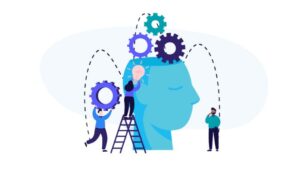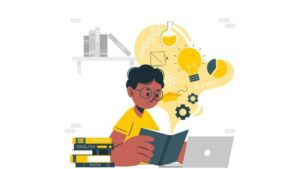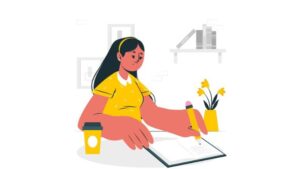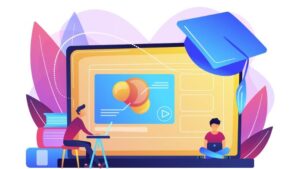The widespread adaptation of digital technology has affected all spheres of our lives, including how we learn today.
Indeed, the Internet has a large influence on how children and students develop and progress in their literary skills.
So, let’s explore the impact of technology on literary skills development, how this process is happening, what it takes, and what the role of specialized educational services is in this process.
Table of Contents
The Steps of Literary Skills Development
Let’s start by outlining the basics of how children and young students work on their literary skills and what it takes to become more proficient in reading and writing.
1. Learning

Reading aloud to children is a great example of that.
Parents expose their children to learning language, vocabulary, and general concepts of storytelling by reading to them.
Such a process also sparks curiosity toward language and encourages children to engage in the learning process.
Later, children learn more about the sounds and appearance of the letters. Various alphabet books, cards, and games help them during this stage.
Now, modern technology can do so much on that front for young children. For instance, the use of AR and VR technology can be a helpful educational stimulant for young students to learn more about literary concepts.
They can also play online games to learn the alphabet and sounds. Multiple learning platforms provide personalized learning based on a student’s progress, strengths, and pace.
2. Reading

Fortunately, the element of storytelling should help engage young children and encourage them to proceed with their reading.
The Internet, of course, offers plentiful reading materials to choose from, offering a great diversity in stories and forms.
Parents or teachers can even visit essaymasters to order more stories of their choice and needs when necessary.
Plus, today, modern technology offers various types of interactive Ebooks with multimedia elements to make reading more of an engaging and fun experience.
This type of technology allows for diverse experiences for learners who struggle to focus and stay interested in the reading task for a long time.
Various services also offer playful approaches to reading, where platforms insert elements of games into the reading lessons.
3. Writing

Parents and teachers can approach this in many ways.
For example, some may use storytelling, tapping into children’s natural creativity and imagination.
Others can start with gaming elements, like playing pretend and writing labels on subjects, creating restaurant menus, or other games that call for writing.
Of course, technology can come in handy here, offering new spaces and platforms to practice literacy skills and creativity. For example, children can learn writing via numerous literacy games and apps.
Some games aim to improve children’s grammar and enhance their letter retention, while others help learners create full sentences using word blocks or other gaming elements.
Another great example of digital help in this learning journey is the availability of digital storytelling platforms.
These platforms create an inviting environment, helping learners write their stories utilizing various gaming elements, multimedia, and other fun bonuses. Meanwhile, such platforms can help structure, organize, and even narrate written stories.
4. Feedback and Discussions

As always, discussion and feedback are big parts of the learning process.
Young learners should know what they achieved so far, how well they did, where to improve, and so on.
From simpler reading sessions accompanied by an adult ready to correct and teach to quizzes for testing children’s knowledge, feedback is essential for the future plan of action.
These days, technology can take the role of a tutor and mentor, analyzing children’s progress and achievements.
Various writing software can help young learners to polish their skills and improve their writing. Many learning apps provide comprehensive analyses of a learner’s successes.
It comes with their strengths, weaknesses, learning pace, total learning hours, etc. Such feedback can be the foundation for future lessons and adjustments so the child can learn productively without losing motivation or interest.
These days, AI-powered platforms can provide comprehensive analysis of one’s language skills and literacy level and offer targeted exercises to refine specific areas of writing.
5. Digital Literacy

However, with the amount of materials online, young learners need to understand.
That’s why parents should also teach children lessons in digital literacy, where they learn to apply critical and analytical thinking, research, and logic in discovering the best materials upon their requests.
Wrap Up!
Specialized educational services have transformed the development of literary skills in the technological era. These services make learning more engaging and accessible, adapting to a digital-savvy generation.
Technology’s integration into education offers innovative ways to enhance literary skills, highlighting the importance of embracing tech in learning. As we progress, this synergy between technology and education will be key in advancing literary skills for a changing world.





